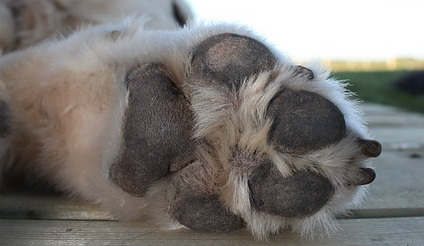My dog has itchy paws. What is the cause and treatment?
Original Question: Buddy has either food or environmental allergies. We have been giving him Nutrience Subzero food brands trying to find out what food he’s allergic to but it’s been really tough trying to pin point what it is. He’s been flaring up constantly and now he’s got numerous little bumps in between his paws and on top that are constantly itching him. We are using ProHex shampoo for dogs but the results are still yet to be seen. Please help we have been trying everything and I hate to see him in pain. Thank you so kindly. - Paul
 Feb 3, 2019
Feb 3, 2019
Hi Paul,
Thanks for your question.
It’s really important when we’ve got an itchy dog for whatever reason that we rule out an underlying parasitic infection such as mites and especially fleas which are incredibly common. We also need to rule out drug reactions, and organ disease that will often be done on history. We also need to rule out secondary bacterial or yeast infections so it really depends on the presentation and there are a number of things that we’ll do when we’re presented with these patients. We’ll use a flea comb to brush their hair. It’s surprising how common fleas are with a quick hair brush which is why it is so important to check. We take plucks of hairs as well and we can do skin scrapes and tape preps to look under the microscope for evidence of mites, bacterial or fungal disease. We can also take biopsies, we can run blood tests and we can also do treatment trials, for example, with parasitic anti-mite treatments. The point I’m trying to make is that there’s a number of diagnostic tests we can do before we jump into the diagnosis of allergic skin disease because ultimately not all itchy dogs are allergic and that’s really important to consider.
Once we’ve determined that it is allergic skin disease there are a number of things that they can be allergic to. The three big ones that I really think of is flea allergic dermatitis, atopic dermatitis which is an allergy to environmental factors such as pollens and dust and then we’ve got food allergies. Flea allergic dermatitis and atopic dermatitis are probably the most common, but food allergies is definitely something to think about and it is very often the case that an allergic dog is allergic to more than one thing. When it comes to atopic dermatitis and also flea allergic dermatitis, there is blood testing that we can we look at or something called intradermal skin testing, which is where we inject little bits of potential allergic compounds under the skin and see what their reaction is. So that’s something that’s often done by a dermatologist, but it may be that your local vet will offer that as well.
This doesn’t actually work very well for dietary allergies though. Now there are some blood tests that are offered, but I don’t consider them to be super reliable. It’s not really something that I consider as an option in the majority of patients. To find out if a dog has a food allergy, we need to do something called a diet trial. Food allergies are most commonly due to the protein or the meat portion of the diet so that’s generally your chicken, beef or pork. Despite what people may say, allergic skin disease resulting from grains is actually pretty uncommon. What a diet trial involves is feeding a novel or a new single source of protein or a hydrolyzed diet. A hydrolyzed diet is where they’ve taken a chicken molecule for example, and then have broken it down into really small bits that the body doesn’t recognize as chicken. So that’s effectively a novel protein that the body won’t recognize and then won’t react to. So the diet you’re feeding fits into neither of these categories. It’s actually gotten lots of different proteins in it, which is one of the selling points and it is grain free. So it’s great if you know your dog is allergic to grains, but like I say, they’re very much the minority. Now the difficult thing about diet trials is that you must feed this single food for up to 12 weeks before responses are seen. Now typically it’s seen a little bit sooner than that, maybe six to eight weeks but really we need to feed it for 12 weeks before we can rule out a food allergy. Sometimes you’ll need to feed two different diets before you can rule it out completely, but they must eat nothing else. If they get any other treats, if they get anything else then that can ruin all of the good work. You can see how challenging feeding one diet with no other treats, no other snacks, not picking anything up off the street and so forth.
There are also elements of atopic dermatitis in dogs that have a food allergy and there are a number of different treatments that we can do that are really varied. It can involve medications or steroids, shampoos, and skin diets which are different to our hypoallergenic diets and food trial diets although they can be used as a skin diet as well because that’s ultimately what they’re designed for but they are often a bit more expensive. From that point of view, they’re not as ideal as a maintenance diet just from cost alone. We can also add fish oils or essential fatty acids to the diet which has anti-inflammatory effects and improves the skin barrier. We can give antihistamines, as some dogs will respond well to antihistamines, others it makes no difference and others it causes sedation but that’s certainly something to consider. We definitely want to be giving parasite preventative products.
If you do go forward with the blood test or if you’ve had the intradermal skin testing then you’ll able to pinpoint the allergen and avoid it. The other thing we can do is go ahead with a desensitization program which is effectively a vaccination for what a dog is allergic to.
One other big treatment of atopic dermatitis, flea allergic dermatitis and dietary allergies is to control flare-ups and secondary infections. Whenever we’ve got a flare up and a dog is becoming itchy and the skin is becoming inflamed, then very often we get an overgrowth of the normal bacteria or yeast that are present on the dog’s skin. It’s very important that we treat that because it will continue to cause itching even if we get the underlying allergy under control. That infection will continue to cause itching, so we need to treat that as well. It’s also worth noting that skin conditions, and especially allergic skin disease, can be incredibly frustrating. There’s no one-size fits all approach. It can involve a lot of playing around with a management plan to find the one that works for you. We could give everything that I’ve discussed and that would probably work, but it would also cost a fortune, it would be time-consuming and difficult to give all multiple medications in one go.
Find out what’s causing the skin issues and to do that I recommend that you work closely with your vet. Finally, if your vet is really struggling and you’re not getting anywhere then I recommend having a referral to a specialist dermatologist is an important step to getting to the bottom of it.
I hope this helps.
Dr. Alex Avery


Disclaimer: healthcareforpets.com and its team of veterinarians and clinicians do not endorse any products, services, or recommended advice. All advice presented by our veterinarians, clinicians, tools, resources, etc is not meant to replace a regular physical exam and consultation with your primary veterinarian or other clinicians. We always encourage you to seek medical advice from your regular veterinarian.

